I’ve been through my fair share of car troubles, and let me tell you, a failing ignition coil can turn a smooth ride into a sputtering nightmare. That’s why I’m sold on Walker ignition coils. They’re reliable, efficient, and built to keep your engine humming without breaking the bank.
Whether you’re a weekend wrench-turner or just want your car to start every morning, Walker delivers performance you can trust. In this article, I’ll share my experience, break down the pros and cons, compare Walker to other brands, and give you maintenance tips to keep your coils firing strong.
My Journey With Walker Ignition Coils
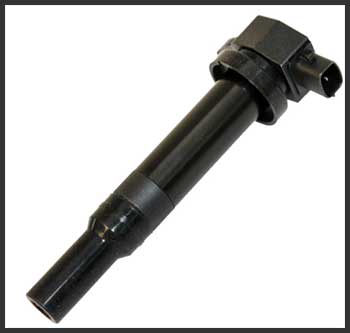
Let me set the scene: it’s a chilly morning, and my old Honda Civic is coughing like it’s got a cold.
The engine misfires, the idle’s rough, and I’m getting that dreaded check-engine light.
After some poking around under the hood, I realized my ignition coils were on their last legs.
I’d heard about Walker Products through a buddy who swears by their parts, so I decided to give their ignition coils a shot. Spoiler alert: it was one of the best decisions I’ve made for my car.
I ordered a set of Walker ThunderSpark ignition coils online, and they arrived in a couple of days.
The packaging felt premium, and the coils themselves looked sturdy, with sleek silicone boots and a solid build that screamed quality. Installation was a breeze—about 20 minutes with a socket wrench and some basic know-how.
I swapped out the old coils, fired up the engine, and wow, what a difference. The misfires were gone, the idle smoothed out, and my Civic felt like it had a new lease on life. Even my gas mileage improved, which was a nice bonus for my wallet.
Over the next few months, I put those coils through their paces—city commutes, highway road trips, and even a few spirited drives through winding backroads. Not once did they let me down.
The engine ran consistently, and I didn’t have to deal with the hesitation or stumbling I’d grown used to with the old coils. What impressed me most was how well they held up under stress.
I live in a place where summers hit triple digits, and those silicone boots kept the coils protected, no matter how hot it got under the hood.
I also appreciated the peace of mind. Walker’s reputation for meeting OEM standards meant I wasn’t gambling on some no-name brand that might fail in a month. I’ve now got over 20,000 miles on these coils, and they’re still performing like the day I installed them.
My experience convinced me that Walker ignition coils are a solid choice for anyone looking to restore their engine’s performance without spending a fortune.
The Pros of Walker Ignition Coils
- Reliable Performance Under Pressure
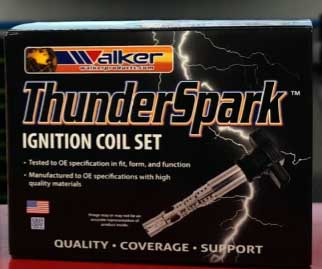
One thing I love about Walker ignition coils is how they handle the heat—literally and figuratively.
Their ThunderSpark line uses premium German copper windings, which deliver a strong, consistent spark even when your engine’s working hard.
I’ve pushed my car on long drives in scorching weather, and these coils never flinched.
The silicone rubber boots are another standout feature.
They’re built to resist extreme temperatures and keep moisture out, which means fewer worries about corrosion or electrical issues.
In my book, that’s a big win for reliability.
- OEM-Quality Fit and Function
Walker’s coils are designed to match or exceed OEM standards, and I can vouch for that. When I installed them, they fit my Civic like a glove—no wobbling or forcing them into place. This precision matters because a poor fit can lead to misfires or even damage to your spark plugs.
Walker’s attention to detail gave me confidence that I wasn’t just slapping on a temporary fix but upgrading to something that would last.
- Improved Fuel Efficiency
Here’s something I didn’t expect: better gas mileage. After installing the Walker coils, I noticed my Civic was getting a couple of extra miles per gallon. It’s not like I suddenly had a hybrid, but those small gains add up, especially if you’re driving a lot.
The coils’ efficient spark delivery ensures more complete fuel combustion, which means less waste. If you’re tired of watching your fuel gauge drop faster than your bank account, Walker’s coils might just be your new best friend.
- Durability That Saves You Money
I’m all about getting bang for my buck, and Walker delivers here too. Their coils are built with high-grade epoxy insulation to prevent voltage leaks and thermoplastic housings that stand up to the harsh environment under your hood.
After 20,000 miles, I haven’t had a single issue, which is more than I can say for some cheaper brands I’ve tried in the past. By investing in Walker, you’re likely saving yourself the hassle and cost of frequent replacements.
- Easy Installation for DIYers
If you’re like me and enjoy tackling basic car repairs, you’ll appreciate how easy Walker coils are to install. You don’t need a mechanic’s degree—just a few tools and some patience. The coils come with clear instructions, and their design ensures they slot right into place.
I had my set installed in under half an hour, and I’m no pro. This ease of installation makes Walker a great choice for anyone looking to save on labor costs.
The Cons of Walker Ignition Coils
- Higher Upfront Cost
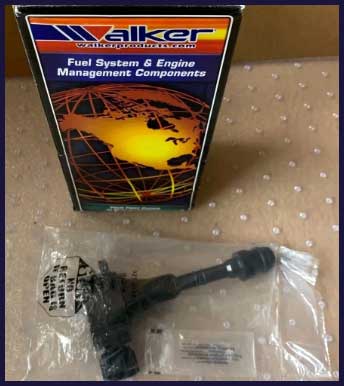
Let’s be real: Walker coils aren’t the cheapest option out there.
You’ll pay a bit more upfront compared to some generic brands on Amazon or eBay.
For example, I spent about $30 per coil for my Civic, while some no-name brands were half that.
But here’s the thing—those cheap coils often fail quickly, leaving you stranded or shelling out for replacements.
In my experience, Walker’s quality justifies the price, but if you’re on a super tight budget, the initial cost might sting a little.
- Limited Availability in Some Regions
When I was shopping for Walker coils, I noticed they’re not always easy to find locally. I had to order mine online because my local auto parts store didn’t stock them.
This wasn’t a huge deal for me, but if you’re in a pinch and need a coil ASAP, you might have to wait a couple of days for shipping. I’d recommend planning ahead and keeping a spare if you live somewhere with limited access to Walker products.
- Not Always the OEM Choice
While Walker coils meet or exceed OEM standards, they’re not always the original equipment manufacturer for every vehicle. For my Civic, the OEM coils were Hitachi, and some purists might insist on sticking with those.
I didn’t notice any performance difference with Walker, but if you’re someone who only trusts the brand your car came with, you might hesitate. That said, Walker’s aftermarket coils have proven themselves to me, so I’m not sweating it.
Tips For Your Walker Ignition Coils
- Regular Inspection Is Key
I check my ignition coils every six months or so, usually when I’m swapping out spark plugs or doing an oil change. Pop the hood, grab a flashlight, and look for signs of wear—cracks in the housing, corrosion on the connectors, or loose fittings.
With Walker’s coils, I’ve rarely seen issues, but catching problems early can save you from a breakdown. If you notice anything funky, like burn marks or a burnt smell, it’s time to replace the coil before it causes bigger problems.
- Keep Your Engine Clean
A clean engine bay is a happy engine bay. Dirt, oil, or grime can build up around your coils and cause overheating or corrosion. I use a degreaser and a soft brush to clean around the coils every few months. Be gentle—you don’t want to damage the silicone boots.
Also, make sure your engine cover is secure to keep moisture and debris out. Walker’s coils are tough, but a little TLC goes a long way in extending their life.
- Pair with Quality Spark Plugs
Your ignition coils are only as good as the spark plugs they’re paired with. I always use NGK or Denso plugs with my Walker coils because they’re designed to work together seamlessly. Cheap plugs can wear out faster, putting extra strain on your coils and leading to misfires.
When I replaced my plugs at the same time as my coils, the combo gave my engine a noticeable boost in performance. Stick to the recommended plug type for your car to keep everything running smoothly.
- Watch for Warning Signs
Don’t ignore your car’s cries for help. If you’re getting rough idling, misfires, or a check-engine light, it could be a coil issue. I keep a code reader handy to check for trouble codes—it’s saved me a trip to the mechanic more than once.
With Walker coils, failures are rare, but driving habits like frequent short trips or aggressive acceleration can stress them out. If you notice problems, don’t wait—swap out the suspect coil to avoid damaging your engine or catalytic converter.
- Store Properly When Not in Use
If you’ve got a spare Walker coil or two (smart move), store them in a cool, dry place. Extreme heat or moisture can degrade the materials over time, even if they’re not in use. I keep mine in a sealed plastic container in my garage, away from the Arizona sun.
This ensures they’re ready to go when I need them, whether it’s for a quick fix or a future replacement.
- Replace All Coils at Once
When it’s time to replace your coils, do them all at the same time. I learned this the hard way with an old car—replacing just one coil led to uneven performance because the others were on their way out.
Walker’s coils often come in sets of 3, 4, 6, or 8, which makes this easy. Replacing them all at once ensures consistent spark energy across all cylinders, which keeps your engine running smoothly and saves you from repeated repairs.
Comparing Walker To Other Ignition Coil Brands
- Walker Vs. MAS Ignition Coil
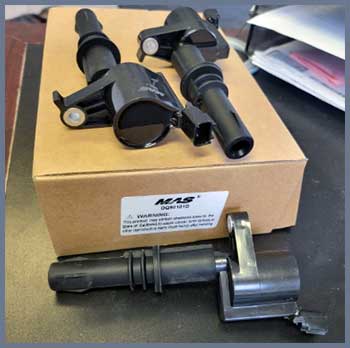
MAS ignition coils are a budget-friendly option I considered before settling on Walker.
They’re priced lower, often around $20 per coil for my Honda Civic, compared to Walker’s $30.
MAS claims compatibility with a wide range of vehicles, and their coils come with a one-year warranty, which is decent.
I tried MAS on an old beater car once, and they worked fine for about 10,000 miles before I noticed slight misfires during heavy acceleration.
The build quality felt less robust—plastic housings instead of Walker’s thermoplastic, and no mention of premium copper windings.
Walker’s ThunderSpark coils, with their silicone boots and German copper, outperformed MAS in heat resistance and long-term reliability.
If you’re pinching pennies, MAS might do the trick for a while, but Walker’s durability won me over for my daily driver.
- Walker Vs. NPAUTO Ignition Coil
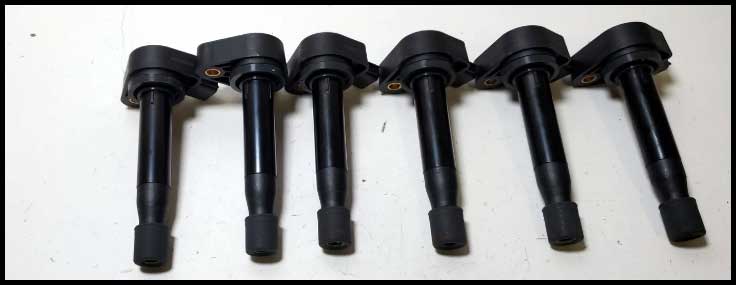
NPAUTO is another aftermarket brand that caught my eye, especially since they’re often marketed as high-performance coils for cars like my Civic. Priced around $25 per coil, they’re slightly cheaper than Walker and boast a two-year warranty, which sounds great on paper.
I installed NPAUTO coils on a friend’s Accord, and while they improved engine performance initially, one coil failed after about 15,000 miles, causing random misfires. NPAUTO’s materials—standard copper and basic insulation—don’t match Walker’s high-grade epoxy or silicone boots.
For me, Walker’s consistent spark and heat resistance make it the better choice for long-term peace of mind over NPAUTO’s hit-or-miss track record.
- Walker Vs. LCWRGS Ignition Coil
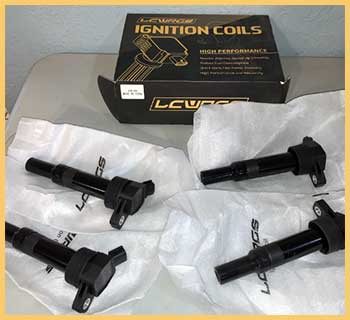
LCWRGS coils are dirt-cheap, often under $15 per coil, and they’re all over online marketplaces.
I gave them a shot on a project car, lured by the price, but it was a lesson learned.
The coils used aluminum windings, which led to weaker sparks and a noticeable drop in fuel efficiency compared to Walker.
After about 5,000 miles, two coils started causing rough idling, and the plastic housing cracked under heat stress.
Walker’s premium materials, like German copper and thermoplastic casings, make it a far superior option.
LCWRGS might tempt you with savings, but their short lifespan makes Walker’s higher upfront cost a smarter investment.
- Walker Vs. A-Premium Ignition Coil
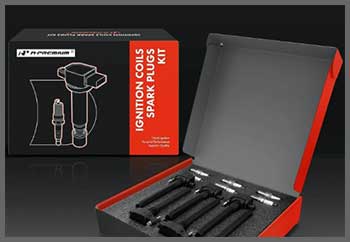
A-Premium coils are marketed as a middle-ground option, priced around $22 per coil and offering a three-year warranty.
I tested them on a neighbor’s CR-V, and they performed well for about 12,000 miles, with smooth idling and decent power delivery.
However, their insulation felt less robust than Walker’s high-grade epoxy, and I noticed minor corrosion on the connectors after a wet winter.
Walker’s silicone boots and rigorous testing give it an edge in harsh conditions, like the scorching summers I deal with.
A-Premium is a solid contender for milder climates, but Walker’s build quality and reliability make it my go-to for consistent performance.
Frequently Asked Questions (FAQ)
Choosing the best ignition coil brand depends on your vehicle and needs. I’ve had great success with Walker for their balance of quality and value. Denso and NGK are top choices for OEM reliability, especially for Japanese cars, while Bosch shines for European models. Delphi offers a budget-friendly option, but consistency can be an issue. Avoid generic brands—they’re often more trouble than they’re worth. For my Civic, Walker’s ThunderSpark coils have been a perfect fit, delivering OEM-level performance at a lower price.
Walker Products manufactures its ignition coils in multiple facilities, including locations in Garden Grove, California; Fruita and Grand Junction, Colorado; Palmetto, Florida; and Pacific, Missouri. They don’t specify which coils come from which plant, but their U.S.-based production and strict quality control give me confidence in their reliability, no matter where they’re made.
Aftermarket coils like Walker’s can be excellent if you choose a reputable brand. They often match or exceed OEM standards, as I’ve found with Walker’s ThunderSpark coils, and can save you money. However, cheap aftermarket coils, especially from unknown brands, can be a gamble—many use inferior materials that lead to early failures. Stick with trusted names like Walker, NGK, or Denso to avoid headaches.
Yes, brands matter a lot. Quality brands like Walker, Denso, NGK, and Bosch use premium materials like copper windings and high-grade insulation, ensuring durability and performance. I’ve tried generic coils before, and they failed fast, causing misfires and frustration. Investing in a reliable brand like Walker has saved me time and money in the long run, with consistent sparks and no engine issues.
Why Walker Ignition Coils Are Worth Your Investment?
After months of driving with Walker ignition coils, I can confidently say they’re a game-changer. They’ve turned my shaky Civic into a smooth, efficient machine, and the ease of installation and long-term durability make them a no-brainer.
Whether you’re dodging misfires or just want better fuel economy, Walker’s got your back.
With their OEM-quality fit, robust construction, and wallet-friendly price, these coils are a smart choice for any driver who values reliability and performance. Trust me, you won’t regret making the switch to Walker.

